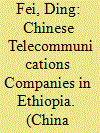| Srl | Item |
| 1 |
ID:
178891


|
|
|
|
|
| Summary/Abstract |
This article examines Chinese engagement in Ethiopia's telecommunications sector. It argues that while theories of developmental state and global production networks contribute important insights on the roles of state agency and inter-firm relations in the rise of global lead firms from East Asia, they are insufficient to interpret the recent overseas ventures of Chinese companies in Africa. A case study of one flagship Chinese telecommunications company in Ethiopia advances the existing literature by highlighting the influences of host government intervention and inter-firm competition in shaping firms’ local operations. Specifically, this article analyses a myriad of changes in the case company's organizational structure and business practices in response to increased market competition administered by the Ethiopian government. Findings reveal that despite benefiting from official inter-state cooperation, Chinese overseas companies are neither static nor merely state-driven players but are flexible in adjusting strategies to improve their competitiveness in the local market.
|
|
|
|
|
|
|
|
|
|
|
|
|
|
|
|
| 2 |
ID:
168786


|
|
|
|
|
| Summary/Abstract |
This study explores the relationship between special economic zones and regional integration in ASEAN countries, and identifies how to leverage the attributes of SEZs to deepen regional integration for regional development. The key argument is that SEZs can play a vital role in promoting regional integration if ASEAN member nations join hands to craft a visionary strategy.
|
|
|
|
|
|
|
|
|
|
|
|
|
|
|
|
| 3 |
ID:
104351


|
|
|
|
|
| Publication |
2011.
|
| Summary/Abstract |
Asian economies' prospects for upward mobility within the global division of labour hinge significantly on the degree to which transnational corporations' (TNCs) global production networks (GPNs) accommodate or hinder their efforts to shift from simple production into more remunerative roles. A growing literature notes the rise in various countries of a 'neo-techno-nationalism' that aims to bolster local innovation and challenge TNCs' technologically derived leverage over the distribution of roles and rewards within GPNs. Industrial and technological policies in Southeast Asia, however, reflect a quite different 'techno-glocalist' strategy. Such strategies are based on a 'governance bargain' in which host governments, in exchange for technological upgrading, facilitate TNCs' exercise of governance authority transnationally as well as in coordinating local investments in innovation and other cluster-building activities. They highlight a conceptual distinction between the degree of internalization and hierarchy within networks that is typically elided in theories of GPN governance.
|
|
|
|
|
|
|
|
|
|
|
|
|
|
|
|
| 4 |
ID:
085952


|
|
|
|
|
| Publication |
2009.
|
| Summary/Abstract |
There is an implicit but commonly held assumption that Chinese businesses are distinctively Chinese. Casting them in unitary and national terms, this assumption has often provided the underpinnings for the conception of the strength of Chinese businesses as signs of an emerging China threat. Drawing on a global production networks (GPN) approach, this paper aims to question the assumption by arguing that many Chinese businesses, embedded in the expanding global and regional production networks, have taken on important transnational characteristics. Given these transnational connections, Chinese business networks in both 'Greater China' and China proper are characterized more by diversity and fragmentation than by cultural coherence and homogeneity. This analysis of the transnationalization and fragmentation of contemporary Chinese businesses helps better understand and respond to the complex challenge posed by the economic dynamism in China.
|
|
|
|
|
|
|
|
|
|
|
|
|
|
|
|